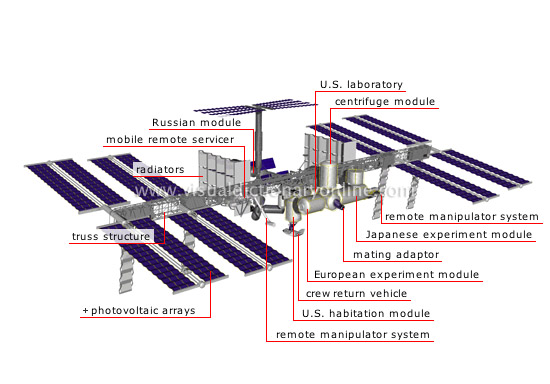international space station
Complex made up of some 10 modules in orbit around Earth; built and assembled by 15 countries, it is used to conduct scientific and technological research on weightlessness.
mobile remote servicer 
Base that supports the arm and allows it to move about the structure.
crew return vehicle 
Vehicle used to bring the crew back to Earth in case of emergency.
remote manipulator system 
This mechanical arm is used to lift heavy loads during the assembly of the station and to perform maintenance work.
Russian module 
Generates the station’s electrical energy using photovoltaic cells.
photovoltaic arrays 
Panels that supply power to the station by transforming the Sun’s light into electrical current.
U.S. habitation module 
Designed to accommodate six persons; contains a kitchen, roomettes, a bathroom and first-aid equipment.
radiators 
Corrugated panels ensuring heat evacuation from the station.
truss structure 
Truss frame attached to the U.S. laboratory.
U.S. laboratory 
Designed to carry out scientific activities, particularly in the life sciences and in physics.
remote manipulator system 
Mechanical arm designed to conduct scientific experiments on the Japanese platform.
centrifuge module 
Module used to create variable artificial gravity, making it possible to study the effect of gravity levels on living organisms.
European experiment module 
Designed to conduct research in the life and materials sciences, in physics and in numerous other technologies.
mating adaptor 
Connector on which the space shuttle orbiter docks during most of the station’s supply and assembly missions.
Japanese experiment module 
Designed to conduct research in the life sciences and in the science of matter; also equipped with a platform for outside experiments.











